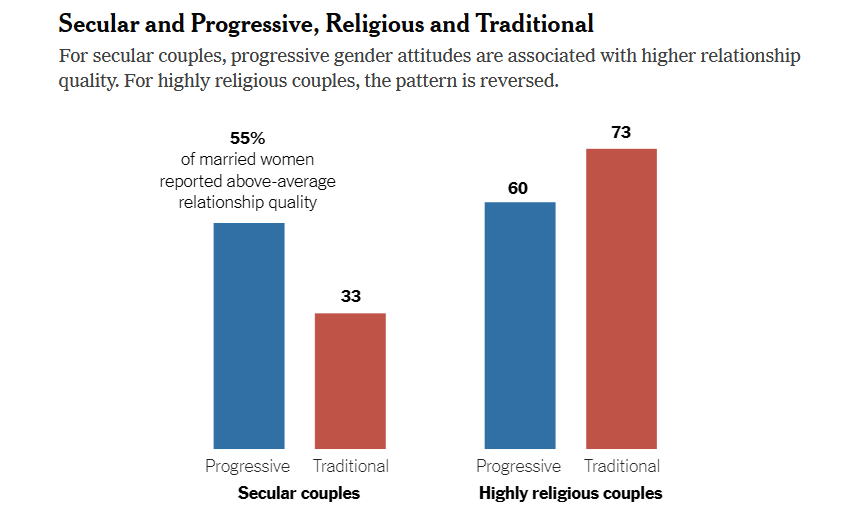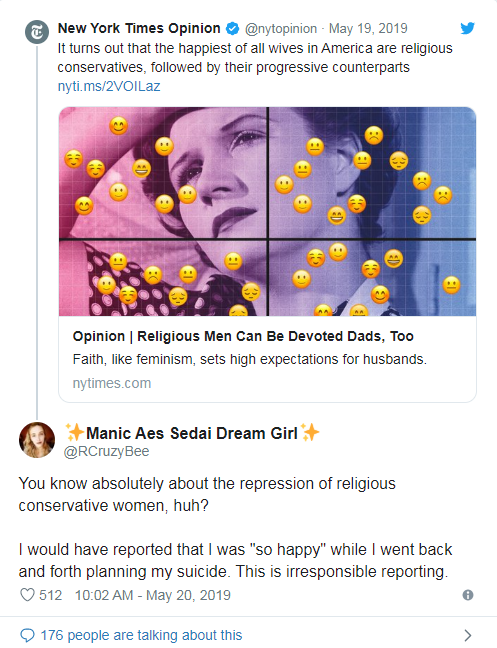Two weeks ago, the New York Times caused an uproar of anger on social media after they published an op-ed showcasing a report that detailed the happiest of American wives identify as religious conservatives.
“It turns out that the happiest of all wives in America are religious conservatives, trailed by their religious progressive counterparts,” the New York Times Opinion wrote in a tweet.
The study was conducted by three professors, W. Bradford Wilcox professor of sociology at the University of Virginia, Jason S. Carroll a professor of marriage and family studies at Brigham Young University, and Laurie DeRose an adjunct lecturer in the sociology department at Georgetown University.
The report, titled ‘The Ties That Bind: Is Faith a Global Force for Good or Ill in the Family?’ was from the Institute for Family Studies and the Wheatley Institution. The results were detailed in the New York Times Op-Ed by the three researchers, Wilcox, Carroll, and DeRose.
What did the study find?
The report found that 73% of wives “who hold conservative gender values and attend religious services regularly with their husbands have high-quality marriages.”
“When it comes to relationship quality, there is a J-curve in women’s marital happiness, with women on the left and the right enjoying higher quality marriages than those in the middle — but especially wives on the right,” the op-ed continued.
The report also found that women in “highly religious relationships are about 50% more likely to report that they are strongly satisfied with their sexual relationship than their secular and less religious counterparts.”
On the other hand, only 53% of secular progressive wives in the United States say that they have high-quality marriages.
The op-ed also noted, “fewer than 46 percent of wives in the religious middle — who attend only infrequently or don’t share regular religious attendance with their husbands — and only 33 percent of secular conservative wives — who think men should take the lead on bread-winning and women on child-rearing but don’t attend church — have such marriages.”
Consider Anna and Greg, a couple that was recently interviewed for a book on marriage. When Anna started having children, she had no wish to work full time outside the home. Anna is not alone in this regard: The Pew Research Center reported in 2013 that about two-thirds of married mothers would prefer not to work full time — a fact that is often overlooked in our public conversation about work and family, which is heavily influenced by liberal assumptions. Anna says she is grateful that because Greg works hard at his small business, she has been able to make this choice.
But more than Greg’s bread-winning, what makes Anna truly happy with her husband is that he is fully engaged on the home front. Not only does he diligently help with the kids’ nightly homework, he is also a fun father — flooding the backyard with water in the winter so the kids can ice skate, taking them on trail hikes in Shenandoah National Park in the summer. He also takes an active role in the family’s religious life: Every night, Greg prays with the children before bedtime.
“I feel so blessed to have Greg as a husband,” Anna said. “His involvement as a father and leadership in the family only adds to my level of happiness.” As research has shown, Anna’s marriage is illustrative of the experience of many women married to men from evangelical Protestant, traditional Catholic or Orthodox Jewish communities.
The Reaction
Social media did not take kindly to the tweet from the New York Times Op-Ed account.
User ‘Atheist Scott’ responded,
“This is hilarious. They all asked their spouses if it was ok to answer the survey in the first place. Then they made it a dinner table conversation to make sure they answered the questions correctly. I know evangelicals,” he added. “Women do not have separate lives.”
Another user, Stephanie McClown, tweeted back,
“I can confirm what all the other Ex-vangelicals are saying.”
“Self-reporting on this is not a reflection of reality. Conservative women are taught that being anything other than happy is a spiritual and moral failure.”
It’s quite interesting that critics refuse to accept the answers and instead want to tell someone else whether or not they are really happy.
One user even said “You know absolutely about the repression of religious conservative women, huh? I would have reported that I was ‘so happy’ while I went back and forth planning my suicide. This is irresponsible reporting.”
While many professed their anger at the study and the tweet provided by the New York Times, there were positive responses as well.
Allie Stuckey, a professed evangelical and conservative pundit, also chimed in saying “the replies to this are so ignorant and bitter.” She later added, “I truly don’t think anyone replying to this has ever met a Christian.”
Another user wrote: “Totally agree..my wife & I have a God-centered focus, and it has made all the difference.”
“Do we have bad days? Of course we do…everyone does, that’s just marriage. The key is to have faith and work through it instead of just giving up!”
****
“For this reason a man shall leave his father and his mother, and be joined to his wife; and they shall become one flesh” (Genesis 2:24).
“Listen, O daughter, Consider and incline your ear; Forget your own people also, and your father's house” (Psalm 45:10).




